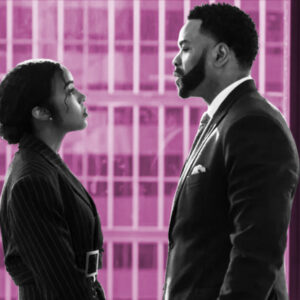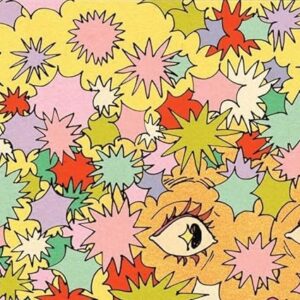I’d never actually eaten at Su Casa Siempre, but I’d passed by it a hundred times and more. When I arrived, people were sitting at tables on the veranda that wrapped around the front of the house. Around back was a patio with dormant heat lamps and lights strung up along a fence that separated the patio from a gravel alley with a large green Dumpster.
The main dining room was packed when I ventured inside, every table filled with dinner guests. The hostess told me I’d have a thirty-minute wait unless I wanted to eat at the bar. She led me through the restaurant, and I sat down on a high metal stool. The bartender quickly delivered a menu and asked if I wanted something to drink. I pointed to the black erase board propped on the liquor shelf. Fangaritas, it said.
“One of those, please.”
A few minutes later my drink arrived: a slushy red margarita in an embarrassingly large glass. I was sipping on it when I realized that I knew the woman sitting at the end of the bar. She was wearing a cottony purple dress with thin straps over her freckled shoulders. Her hair, straight and dark, swished softly across her face as she made fierce notes on the top sheet in a stack of papers. To the left of her papers was a frosty glass of white wine. Her name was Annie, and we’d dated briefly in high school, though we hadn’t been in touch since those days. I watched her work for a few minutes before summoning enough courage to go over and tap her on the shoulder.
“No way!” she said, springing off her stood.
We hugged. She smelled exactly the way I remembered. Like spearmint.
Annie was the first girl who’d ever shown me much interest. I’d known her, tangentially at least, since kindergarten, but it was only in ninth-grade biology class that I began to notice certain things about her—the faint constellation of freckles around her eyes visible beneath her makeup, the thin perfect gap between her two front teeth, the spearmint-scented cloud that followed her wherever she went.
Always spearmint. The outer pocket of her backpack seemed to contain an endless supply of the green packaged gum. She unwrapped the foil from each stick with such precision, peeling back the paper and flattening the foil on her desk under her fingernail before bringing the stick to her parted lips. Once the gum was in her mouth, I was pleased to observe, she wouldn’t allow herself the pleasure of chewing it until she had folded the foil into a tight silver accordion and placed that accordion in the back pocket of her biology notebook. This was a performance enacted sometimes three and four times in a single class. It was curiously erotic, despite the formaldehyde smell that hung in the room. How had this amazing girl escaped my attention for so long?
Annie was at the restaurant alone, finishing up a little work before going home for the evening, but she invited me to join her at the bar for a few minutes. I explained the nature of my visit, that this was in fact a covert investigation on behalf of my employer. Sort of. She thought that was funny.
She gave me a quick rundown of the last fourteen years in her life: a theater major at the College of Charleston, two not‑so‑great years selling medical equipment over the phone, five slightly better years working as a paralegal for an immigration law firm and then later as an assistant arts manager at a live theater in Charleston. She had a twelve-year-old daughter named Fisher, who Annie said was “one of the coolest girls on the planet.” They’d just moved back to Shula in order to be nearer to her parents, and Annie had taken a job as an outreach coordinator and sometime director for Shula’s live theater.
Through the grapevine I’d heard something about her having had a kid and also something about a marriage. Something about a dead husband, too. A drowning, maybe. Something tragic. A topic to avoid, surely.
I asked her if it was strange to be back in Shula again.
“A little. I missed the mountains. The little mirrors at the intersections on the curvy roads. The cool mornings. But everything’s changed. There’s a CVS where my favorite meat-and-three used to be. And have they renamed the streets? Or made new ones? I keep getting lost. I make a wrong turn and end up behind strip malls that didn’t used to be there. I always seem to wind up at the backs of things, not the fronts. My parents think it’s funny. It’s not like Shula’s a big town, you know? The GPS in my brain is screwy, I guess. So you never left, huh?”
“Just for college. Chapel Hill.”
“Right, I knew that.”
We were both quiet for a moment.
“Hey, I have an idea,” she said. “Let’s not pretend like we don’t know anything about each other. Let’s be honest and just admit that we’ve looked each other up, occasionally, over the years. What’s the Internet for, if not prying into the lives of people we used to feel up.”
“Okay, agreed.”
“Good. So. My husband died.”
“Yes, I was really sorry to hear about that. How long ago was it?”
“Seven years. Not quite eight.” She grimaced. “And I was sorry to hear about your heart attack. How are you feeling, by the way?”
Not a heart attack, I corrected, but cardiac arrest. An important distinction. Heart attacks were what killed old fat men who’d been eating cheeseburgers and fried chicken all their lives. Cardiac arrest could kill anybody at any time—even strong, able-bodied men such as myself.
I got out my phone and tapped on the screen. My heart blossomed into digital view. I’m not sure why, but I found it soothing to be able to look at it whenever I pleased. Sometimes, when I had trouble falling asleep at night, I’d turn up the volume and listen to my heart beating. Bringing home a puppy for the first time, they say it’s best to stick a ticking clock in the box because supposedly the sound reminds the dog of its mother’s heart and brings it comfort. I was kind of like that puppy. As long as I could hear my heart, I was still alive. I was still here. This—the possibility that, at any moment, I would cease to be here—was what made it so difficult to fall asleep, I think.
I raised the volume so that Annie could hear my heartbeat over the noise of the restaurant. She seemed confused until I positioned the screen directly over my chest, creating a little window through my skin and rib cage.
“State of the art,” she said. “Looks healthy to me.”
“Yes, I’m all good now, though it was a nail-biter for about four or five minutes. Technically I was dead there for a bit.”
She squeezed my arm and let go again. “That’s so weird because. . .” She looked embarrassed. “Well, I’ve been checking out services at this new church in town. The Church of Search. You heard of it? I won’t lie, it’s a little weird. Nondenominational. Nominally Christian. It’s based in LA, but they have satellite campuses all over. This one meets in the old Masonic Temple here in town. A friend of a friend recommended I try it. Each week you listen to a different featured speaker— astronauts and Walt Whitman scholars and theologians. Sort of like TED Talks but with a Jesus bent. Anyway, a couple of weeks ago, the speaker was a lady who died and then came back again. She called herself Miss Lazarus. She told us she met God and He’s like a giant sun except instead of heat he radiates love. Nice, huh?”
“Very. I like that.”
“So, did you visit a giant God-sun? Any good news for me from the other side? Did your dead grandparents come to collect you at the arrivals gate?”
“God, I wish. Unfortunately I am unable to confirm the existence of a heaven. I saw nothing at all.”
“Nothing?”
I shook my head.
“Well, that’s alarming.”
“Isn’t it?” I took a sip of my drink. “And thank you for saying so. Most people brush it off when I tell them. They tell me not to worry. My dad thinks it was good for me. A wake‑up call. He’s been an atheist since the sixth grade, when he read a book about the heat-death of the universe. As for my mother, I tell her about what happened and she starts throwing scripture at me. She says we all fall into some sort of deep sleep when we die, a thoughtless coma, and we only wake up again when Jesus returns to judge the living—”
“To have gone through at least the first few stages of death and to have returned without any glimpse of what lies beyond had been, to put it mildly, belief-shattering.“
“And the dead, sure.” Annie nodded. “But does she actually believe that?”
“If my mother’s pastor told her the only way into heaven was a strict diet of frog legs, she’d eat nothing but frog legs for the rest of her life.”
Annie arched her eyebrow. “What about you?”
“Would I eat the frog legs?”
“Before your heart problem, what did you think would happen when you die?”
Growing up, I explained, I’d always been told (primarily by my mother) that one of two fates awaited us all: heaven or hell. Glitz or doom. Heaven was a sparkling, glistening place, populated with voluptuous, gender-neutral angels and boisterous choirs singing songs so sweet your ears wept tears of joy. As for hell, it was much as you’d expect: eternal torture at the hands of the devil. As an adult, my conception of each place had evolved significantly, of course. Maybe heaven was achieving unity with God. Maybe hell was being cut off from the rest of Mother Universe; it was eternal isolation and darkness. But to have gone through at least the first few stages of death and to have returned without any glimpse of what lies beyond had been, to put it mildly, belief-shattering.
“Well, maybe you just weren’t dead long enough,” Annie said. “You didn’t go deep enough.”
“Possibly. Yes. I don’t know.”
She took a sip of her white wine. “By the way, from now on, when people ask you about this, I think you should lie. Just tell them it was all unicorns and cotton candy on the other side. Consider it a kindness.”
She smiled; a joke.
“I’m pretty sure that’s how new religions get started.”
“Well, the important thing is that you survived, you’re doing better.” She cupped her hand over mine on the bar. “I’m glad you’re still with us, Jim.”
I couldn’t decide if she was flirting with me or expressing sympathy—or both. Was it appropriate for me to reciprocate? Her husband had been dead for seven years, which seemed to me like more than enough time for us to flirt, guilt-free. I could feel each of her fingers on mine. Her nails were painted red. Her touch was soft and cool. I felt as if some rare, magical hummingbird had alighted upon me, and even to glance at it might scare it away. I tried to remain calm, still. My heart was beating faster now, and because I’d left the HeartNet app open on my phone, we could both hear it accelerating. I might as well have flashed her an erection; that’s how exposed I felt.
I snatched the phone off the bar, embarrassed, and she returned her hand to her lap under the bar. That was when I spotted the restaurant owner, Ruth Glazer, at the far end of the bar with a towel over her shoulder. She was a slim, red-haired woman. She grabbed a television remote from behind a tray of overturned shot glasses and, pointing it at one of the two flat-screens on the wall, changed the channel to a soccer game. I signaled over to her. We’d met once before, at the bank when she’d delivered a stack of documents, and she rushed toward me now with an outstretched hand.
“Jim! You should have told me you were coming. I could have sent over something special.”
An impromptu visit, I explained.
“Let me at least show you upstairs while you’re here. Show you what our plans are.”
I looked at Annie. “Care to have a look upstairs?”
“Sure, why not.”
Together we followed Ruth around the corner of the bar and down a narrow, carpeted hallway, at the end of which was a staircase—a tightly winding staircase of dark red wood, very pretty though in obvious need of repair.
“Use the rail, please,” Ruth instructed, gripping the bannister like she expected the steps to buckle. We did as we were told. We reached the second floor, where there was a bathroom, two bedrooms, a linen closet, and old shag carpets on the floors. The smell of mouse urine mixed with the cooking smells rising up from the kitchen below us. Distantly we could still hear the chatter and clatter of dinner guests.
One of the bedrooms was full of giant crates and collapsed boxes. Ruth explained that they’d mostly used the space for storage until now. What she wanted to do was rip out most of the walls and open up the space for more tables.
“Very nice,” I said, nodding.
“Takes a little imagination, doesn’t it?” Annie said. “These sorts of projects?”
“Very much so,” Ruth said proudly.
We were moving back to the stairs when I stopped the owner.
“I’m sorry,” I said, “but I have to ask. This won’t affect your loan, but why the two thousand dollars in extermination fees?”
“That again?” Ruth said, and rubbed the back of her neck.
“Did you have, like, a family of possums living up here? It’s just such a strange, large amount.”
She sucked in her lower lip and chewed on it in a way that suggested she was perturbed.
“Okay, I’m going to show you something, but I’d appreciate a little discretion once I do. It’s not a secret, but it’s not exactly something I want advertised either.”
She took a few steps down the stairs, and I assumed we were on our way to the kitchen, where she would reveal a hole in the baseboard behind the stove, the entrance to a rat’s nest, something terrible and stomach-churning, but she stopped us halfway down and pressed her back f lat to the wall.
“Do like me,” she said.
And so all of us stood side by side, butts against the wall as if we were making room for a person to pass with a large tray of food. We’d been standing that way for two or three minutes, silently, when I asked her, as pleasantly as possible, what the hell we were doing.
“You’ll know it when it happens,” she said.
“When what happens?” Annie asked.
“Just wait.”
We waited.
“Just wait,” she said. “It can take some time.”
“How long?” I asked.
“Depends. You can’t rush it.”
Annie’s stomach growled. “Sorry,” she said.
We waited for a few more minutes and then Ruth said, “It never happens when you want it to. I have no control here, you have to understand. She’s not a magic trick.”
“She?” Annie asked.
Ruth nodded and invited us downstairs to her office for another demonstration. She said she had something else she could show us since this didn’t seem to be working tonight. “Keep hold of the rail as we go down,” she warned.
Her office was a small room off the kitchen. The flimsy white shelves on the wall over her desk were overloaded with papers and files. Under the desk sat a small pea-green safe and a stack of blank employment forms. She shut the door and sat down in a roller chair. We unstacked two dining chairs from behind her door and arranged ourselves near her computer, which she’d just turned on.
“I think I should just play you this without any introduction,” she said, turning the computer speakers toward us, fiddling with the knobs.
What we heard when she pressed Play was a whooshing noise, sort of like a vacuum cleaner or television static.
“So what is this exactly?” I asked.
She smiled. “This, my friend, is the proof.”
__________________________________
From The Afterlives. Used with permission of Riverhead Books. Copyright © 2018 by Thomas Pierce.













